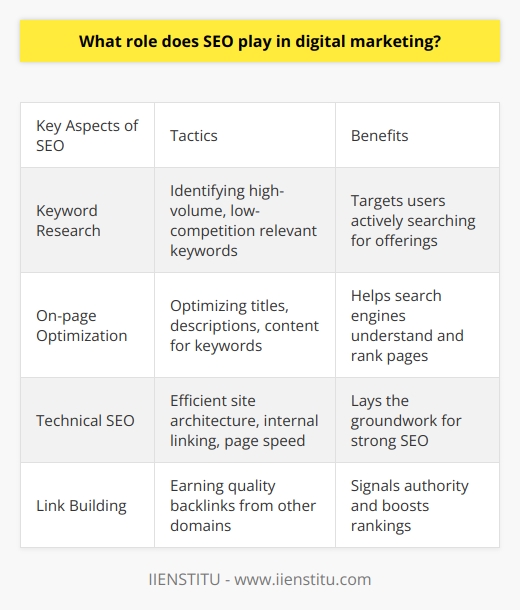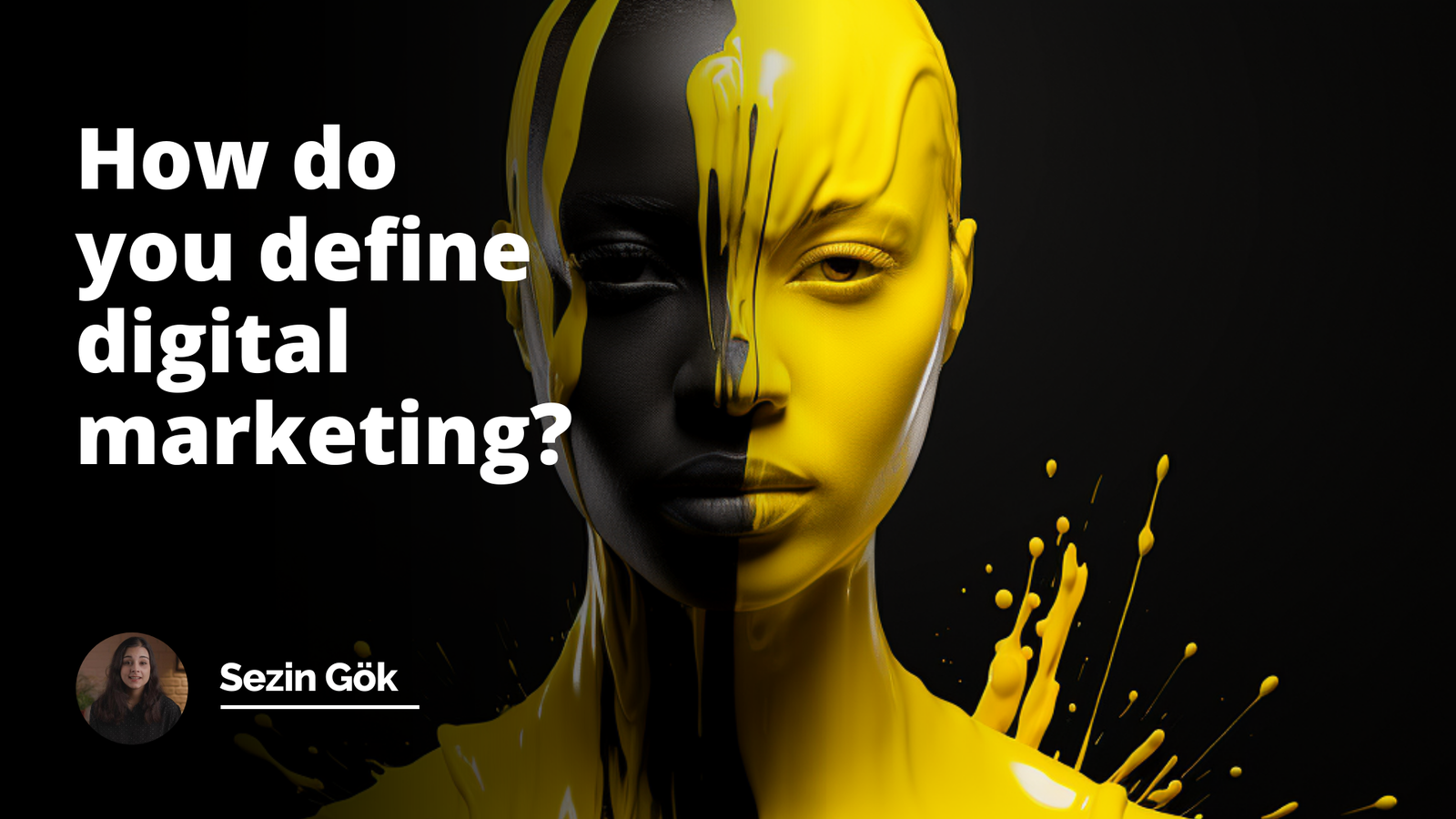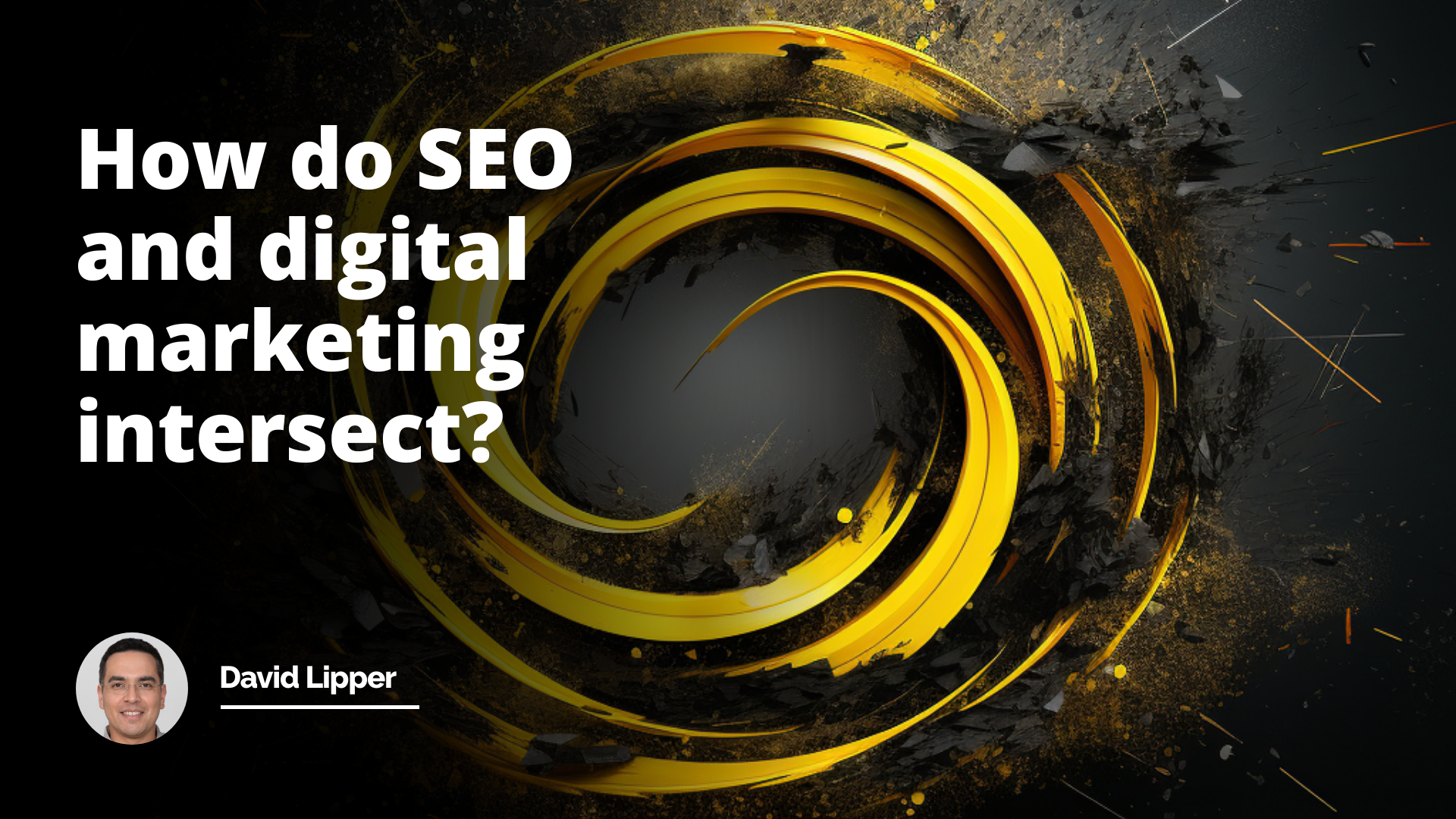
In today's rapidly changing digital landscape, it feels like every day brings something new. Just the other day, I was chatting with an old friend who runs a small bakery in town. She told me, "I have the best pastries in the neighborhood, but people don't seem to find me online." It struck me how crucial it is for businesses, big or small, to not just exist but to shine brightly in the crowded online marketplace.
That's where search engine optimization (SEO) and digital marketing come into play. You might have heard these terms thrown around in various contexts, but understanding how they intersect can make all the difference in maximizing your online presence.
Let me share my journey of discovering the intersection between SEO and digital marketing. Back when I was starting my career, I thought SEO was just about stuffing keywords into web pages, and digital marketing was merely about posting ads. Boy, was I wrong!
The Personal Encounter with SEO and Digital Marketing
I recall working on a project for a local nonprofit organization. They had a noble cause but were struggling to reach their audience online. They asked me, "How can we get more people to find us on the internet?" It wasn't just about appearing on search engines; it was about connecting with people on a deeper level.
That's when it dawned on me: SEO is not just a technical process, and digital marketing is more than just advertising. Both are intertwined strategies that, when combined effectively, can propel a business to new heights.
Understanding the Intersection
At its core, SEO is about making your website more visible to people who are searching for products or services related to your business. Digital marketing, on the other hand, is an umbrella term that includes all online marketing efforts.
Think of it like baking a cake. SEO is the flour and sugar, essential ingredients that give the cake its structure. Digital marketing is the icing and decorations, making the cake appealing and enticing to eat. You need both to make a delicious cake that everyone wants a piece of!
SEO and digital marketing are interconnected strategies that complement each other in various ways. While SEO primarily focuses on optimizing websites and content for search engines, digital marketing encompasses a broader range of tactics, including social media marketing, email marketing, and paid advertising.
SEO and digital marketing intersect through content creation and optimization. A fundamental aspect of SEO is creating high-quality, relevant, and engaging content that resonates with the target audience. Digital marketing strategies such as social media marketing and content promotion play a crucial role in maximizing the reach and visibility of this content.
Both SEO and digital marketing share the ultimate goal of driving organic traffic to a website and improving its online visibility. SEO achieves this through on-page and off-page optimization techniques, while digital marketing leverages various channels to promote the website and attract targeted traffic.
Keyword research is a key area where SEO and digital marketing intersect. Both strategies rely on identifying relevant keywords and incorporating them strategically into content to improve search engine rankings and attract the right audience.
User experience (UX) is another aspect where SEO and digital marketing converge. SEO ensures that websites are user-friendly, easy to navigate, and optimized for mobile devices, while digital marketing focuses on delivering a seamless and enjoyable user experience across all touchpoints.
Context: Discuss how SEO and digital marketing intersect based on the specific industry, target audience, and business objectives. Provide relevant examples to support your answer.
Tools and analytics: Highlight the importance of using tools and analytics to measure the effectiveness of both SEO and digital marketing strategies. Discuss how data-driven insights can help refine and optimize these strategies for better results.
Integration: Emphasize the need for seamless integration between SEO and digital marketing efforts. Talk about the importance of aligning content creation, promotion, and optimization strategies to achieve maximum impact.
Evolving landscape: Acknowledge that SEO and digital marketing strategies constantly evolve with changing algorithms, consumer behavior, and industry trends. Discuss the importance of staying updated and adapting strategies accordingly.
Key Areas Where SEO and Digital Marketing Intersect
Let's delve deeper into how SEO and digital marketing overlap. There are several key areas where the two intersect:
1- Content Creation and Optimization
Creating valuable content is at the heart of both SEO and digital marketing. Whether it's blog posts, videos, or infographics, content drives engagement. But without optimizing this content for search engines, it might never reach your intended audience.
I remember writing an informative article about eco-friendly living. It was well-researched and engaging, but it didn't attract much traffic initially. After optimizing it with relevant keywords and meta descriptions, the article's visibility skyrocketed! That's the power of combining content creation with SEO.
Can you explain the relationship between SEO and digital marketing?
How are SEO and digital marketing connected to each other?
In what ways do SEO and digital marketing intersect?
Can you describe the correlation between SEO and digital marketing?
How do SEO and digital marketing complement each other?
What is the overlap between SEO and digital marketing?
Could you outline the similarities and differences between SEO and digital marketing?
Can you discuss the integration of SEO within digital marketing strategies?
What role does SEO play in the context of digital marketing?
How do SEO techniques contribute to achieving digital marketing goals?
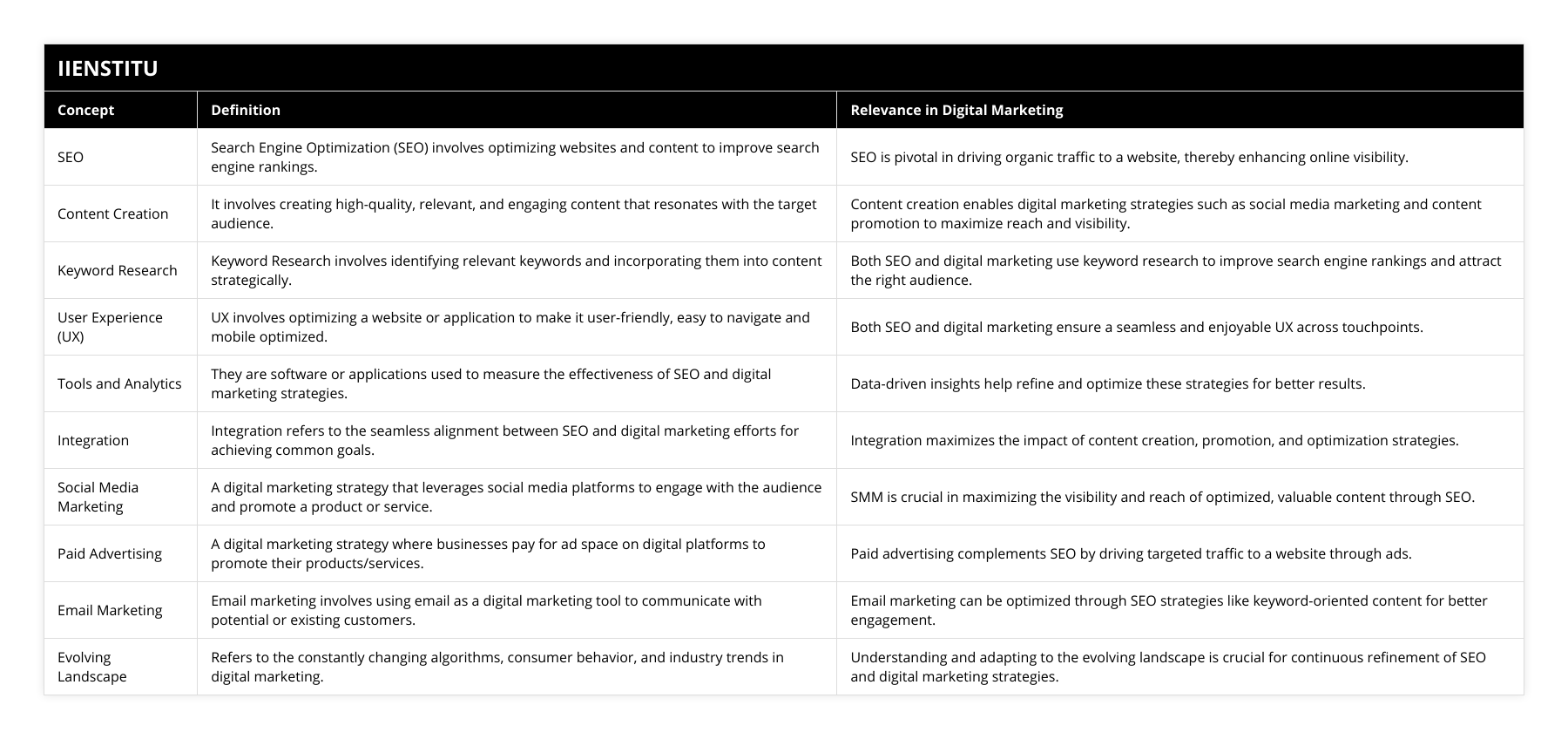
2- Keyword Research
Both SEO and digital marketing rely heavily on understanding what your audience is searching for. By identifying long-tail keywords and incorporating them naturally into your content, you can attract more qualified traffic.
For instance, instead of targeting a broad keyword like "marketing," focusing on a phrase like "optimize supply chain management process tips" can attract a more specific audience looking for exactly what you offer.
3- User Experience (UX)
A website that's difficult to navigate will frustrate users, causing them to leave quickly. SEO focuses on optimizing site structure and load times, while digital marketing ensures the content aligns with user expectations.
Consider the times you've left a website because it was too slow or cluttered. A seamless user experience keeps visitors engaged and encourages them to explore more.
4- Analytics and Data-Driven Strategies
Both disciplines rely on data to make informed decisions. Tools like Google Analytics provide insights into user behavior, helping you refine your strategies.
I once worked with a client who was pouring money into paid ads without seeing results. By analyzing the data, we discovered that optimizing their site for certain keywords brought in more organic traffic than paid campaigns. It was a game-changer!
5- Social Media Integration
While social media isn't a direct ranking factor in SEO, it plays a significant role in digital marketing. Sharing optimized content on social platforms increases its reach and can indirectly boost SEO through increased backlinks and engagement.
Remember how a viral post on social media can lead to a surge in website traffic? That's the magic of integrating SEO with social media marketing.
Why is This Intersection Important?
Understanding how SEO and digital marketing intersect isn't just academic; it's practical and vital for business success. Interviewers often ask candidates, "How do SEO and digital marketing intersect?" to gauge their holistic understanding of online marketing strategies.
The Purpose of the Question
When you're asked this question in an interview, the interviewer is assessing your ability to see the bigger picture. They want to know if you can integrate different strategies to achieve common objectives.
Are you able to align SEO efforts with broader marketing goals?
Can you provide practical examples of integration?
At What Interview Level is it Asked?
This question can pop up at various levels, from entry-level positions to senior roles. The expected depth of your answer will vary accordingly.
Entry-Level Positions: Demonstrate a basic understanding of both concepts.
Mid-Level Positions: Provide specific examples and show how you've applied these strategies.
Senior Roles: Discuss strategic integration and how it impacts overall business goals.
What Kind of Answer is Expected?
The interviewer is looking for:
Clarity of Thought: Can you explain complex concepts simply?
Strategic Thinking: Do you understand how to leverage both SEO and digital marketing?
Practical Examples: Can you draw from personal experience?
Crafting Your Answer: What to Consider
When answering, consider the following points:
Contextual Understanding: Tailor your answer to the industry or company you're interviewing with. If they're in e-commerce, discuss how SEO drives online sales.
Integration Strategies: Talk about how aligning SEO with content marketing, social media, and other digital channels amplifies results.
Data and Tools: Mention how analytics tools help in measuring and refining strategies.
Adaptability: Acknowledge the evolving nature of both fields and the need to stay updated.
Practical Examples and Experiences
Let me share a story from my own career. Working with a boutique fashion brand, we were struggling to stand out in a saturated market. Traditional advertising wasn't cutting it. So, we decided to merge our SEO efforts with our digital marketing campaigns.
Step 1: Keyword Research
We identified niche long-tail keywords like "sustainable handcrafted jewelry" and optimized our product pages accordingly.
Step 2: Content Marketing
We created engaging blog posts and videos around these keywords, sharing the craftsmanship stories behind our products.
Step 3: Social Media Promotion
Leveraging platforms like Instagram and Pinterest, we shared our optimized content, engaging with our audience directly.
Step 4: Analytics and Adjustment
Monitoring our website traffic and social engagement, we continuously refined our strategies.
The result? A significant increase in organic traffic, higher engagement rates, and ultimately, a boost in sales! This success story highlights how SEO and digital marketing not only intersect but complement each other when executed thoughtfully.
Revisiting the Basics: Digital Marketing is What Drives Engagement
You might be wondering, digital marketing is what, exactly? At its core, digital marketing (also referred to as digital mktg) encompasses all marketing efforts that use the internet or electronic devices. It's about reaching customers where they spend most of their time: online.
Digital and marketing efforts include a variety of channels such as social media, email, search engines, and websites to connect with current and prospective customers. In today's world, understanding marketing and digital marketing strategies is essential for any business aiming to succeed.
SEO & Marketing: A Dynamic Duo
When we talk about SEO & marketing, we're really discussing the synergy between optimizing your content for search engines and promoting it through digital channels. This combination is what makes a marketing strategy robust and effective.
In fact, incorporating SEO into your digital marketing marketing plan ensures that you're not just reaching out to your audience but also making it easier for them to find you organically.
Defining Marketing Digital Marketing Strategies
Developing a comprehensive marketing digital marketing strategy involves aligning your SEO efforts with other marketing tactics. This means considering how your optimized content fits into email campaigns, social media posts, and even paid advertising.
An effective digital marketing digital marketing approach recognizes SEO as a foundational element. It's not just about creating content; it's about a digital marketing plan that integrates SEO at every level.
Key Differences Between SEO and Digital Marketing
While they intersect, it's important to understand their distinctions.
SEO
Focuses on organic search results.
Involves on-page and off-page optimization.
Aims to improve website visibility in search engines.
Digital Marketing
Encompasses all online marketing efforts, including SEO.
Includes social media marketing, email marketing, paid advertising, etc.
Aims to engage customers across various digital channels.
Understanding these differences helps in strategizing effectively.
Common Goals and Objectives
Both SEO and digital marketing share common goals:
Increase Online Visibility
Drive Qualified Traffic
Enhance User Engagement
Boost Conversion Rates
Build Brand Awareness
By aligning their strategies, businesses can achieve these objectives more efficiently.
Impact of SEO on Overall Digital Marketing Strategy
SEO is not a standalone tactic; it's an integral part of the overall digital marketing strategy.
Content Optimization: Enhances the effectiveness of content marketing.
Cost Efficiency: Organic traffic reduces reliance on paid advertising.
Long-term Results: SEO efforts build over time, yielding sustainable benefits.
Tips for Leveraging the Intersection
Here are some practical tips:
1- Integrate SEO with Content Marketing
Develop content around targeted keywords.
Ensure content is valuable and relevant.
2- Use Social Media to Amplify SEO
Share SEO-optimized content on social platforms.
Engage with your audience to encourage shares and backlinks.
3- Focus on Local SEO
Optimize for local searches if applicable.
Use location-based keywords.
4- Monitor and Analyze
Use analytics tools to track performance.
Adjust strategies based on data insights.
5- Stay Updated with Trends
Digital marketing digital marketing is ever-evolving.
Keep abreast of the latest SEO and digital mktg techniques.
Conclusion
The intersection of SEO and digital marketing is a dynamic space where creativity meets strategy. By understanding how these two areas complement each other, businesses can create a cohesive online presence that not only attracts visitors but also engages and converts them.
Remember, it's not about choosing between SEO and digital marketing. It's about integrating them effectively to achieve your goals. Whether you're answering an interview question or strategizing for your business, recognizing this intersection is key to success in the digital landscape.
Similar Interview Questions
Can you explain the relationship between SEO and digital marketing?
How are SEO and digital marketing connected to each other?
In what ways do SEO and digital marketing intersect?
Can you describe the correlation between SEO and digital marketing?
How do SEO and digital marketing complement each other?
What is the overlap between SEO and digital marketing?
Could you outline the similarities and differences between SEO and digital marketing?
Can you discuss the integration of SEO within digital marketing strategies?
What role does SEO play in the context of digital marketing?
How do SEO techniques contribute to achieving digital marketing goals?
References
Porter, M.E. (1985). Competitive Advantage: Creating and Sustaining Superior Performance. New York: Free Press.
Chaffey, D., & Ellis-Chadwick, F. (2019). Digital Marketing: Strategy, Implementation and Practice (7th ed.). Pearson Education Limited.
Kotler, P., Kartajaya, H., & Setiawan, I. (2017). Marketing 4.0: Moving from Traditional to Digital. Wiley.
Ledford, J.L. (2009). SEO: Search Engine Optimization Bible. Wiley Publishing, Inc.
Ryan, D. (2016). Understanding Digital Marketing: Marketing Strategies for Engaging the Digital Generation (4th ed.). Kogan Page Publishers.
Frequently Asked Questions
How do SEO and digital marketing intersect?
SEO and digital marketing intersect in several ways. SEO, or search engine optimization, is a key component of digital marketing strategies. It involves optimizing websites and content to rank higher on search engine results pages (SERPs). This helps increase visibility and organic traffic. Additionally, SEO research and analysis inform digital marketing campaigns, ensuring they align with target audience preferences. By incorporating SEO techniques like keyword optimization, meta tags, and link building, digital marketers can enhance website performance, boost online presence, and drive meaningful conversions. Ultimately, SEO and digital marketing work together to enhance a brand's online visibility and maximize its marketing efforts.
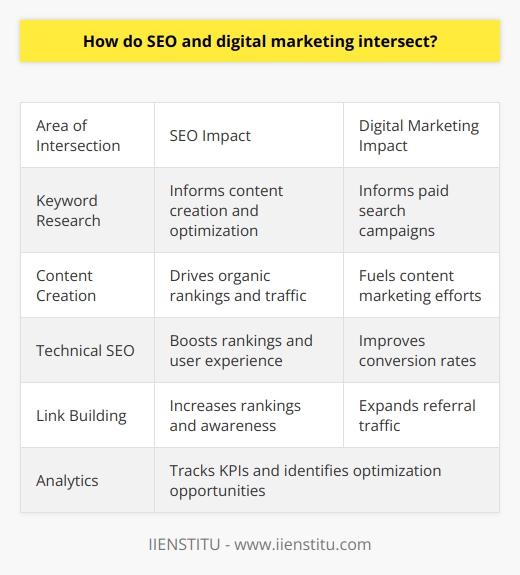
Can you explain the relationship between SEO and digital marketing?
SEO and digital marketing have a close relationship. SEO refers to the practice of optimizing websites to rank higher in search engine results. Digital marketing encompasses various strategies and tactics to promote products or services online.
By successfully implementing SEO, digital marketing efforts can benefit from increased organic visibility and targeted traffic. SEO helps improve website visibility by making it more attractive to search engines.
Digital marketing utilizes SEO to enhance website content and structure. Strategic keyword usage, quality backlinks, and relevant meta tags are essential elements of SEO.
These SEO techniques support digital marketing efforts by making the website more discoverable. A higher search engine ranking results in more website visits, increasing the potential for conversions and sales.
Moreover, implementing SEO principles can enhance the user experience, improving website navigation and loading speed. This positively impacts digital marketing efforts, as users are more likely to engage with a website that offers a smooth and intuitive experience.
In conclusion, SEO and digital marketing share a symbiotic relationship. SEO techniques bolster digital marketing initiatives by increasing website visibility, attracting targeted traffic, and enhancing the user experience. By aligning SEO strategies with digital marketing goals, businesses can achieve better online visibility and optimize their marketing efforts.

What role does SEO play in digital marketing?
SEO, or search engine optimization, is a crucial component of digital marketing. It plays the role of enhancing a website s visibility and attracting organic traffic by optimizing its search engine rankings. SEO helps websites rank higher in search engine results pages (SERPs) by employing various techniques aimed at improving the website s relevance and credibility. This process involves keyword research, on-page optimization, and link building, among others. By implementing SEO strategies, digital marketers can increase their brand exposure, reach the targeted audience, and ultimately improve their website s performance. Therefore, SEO plays a vital role in ensuring the effectiveness and success of digital marketing campaigns.
